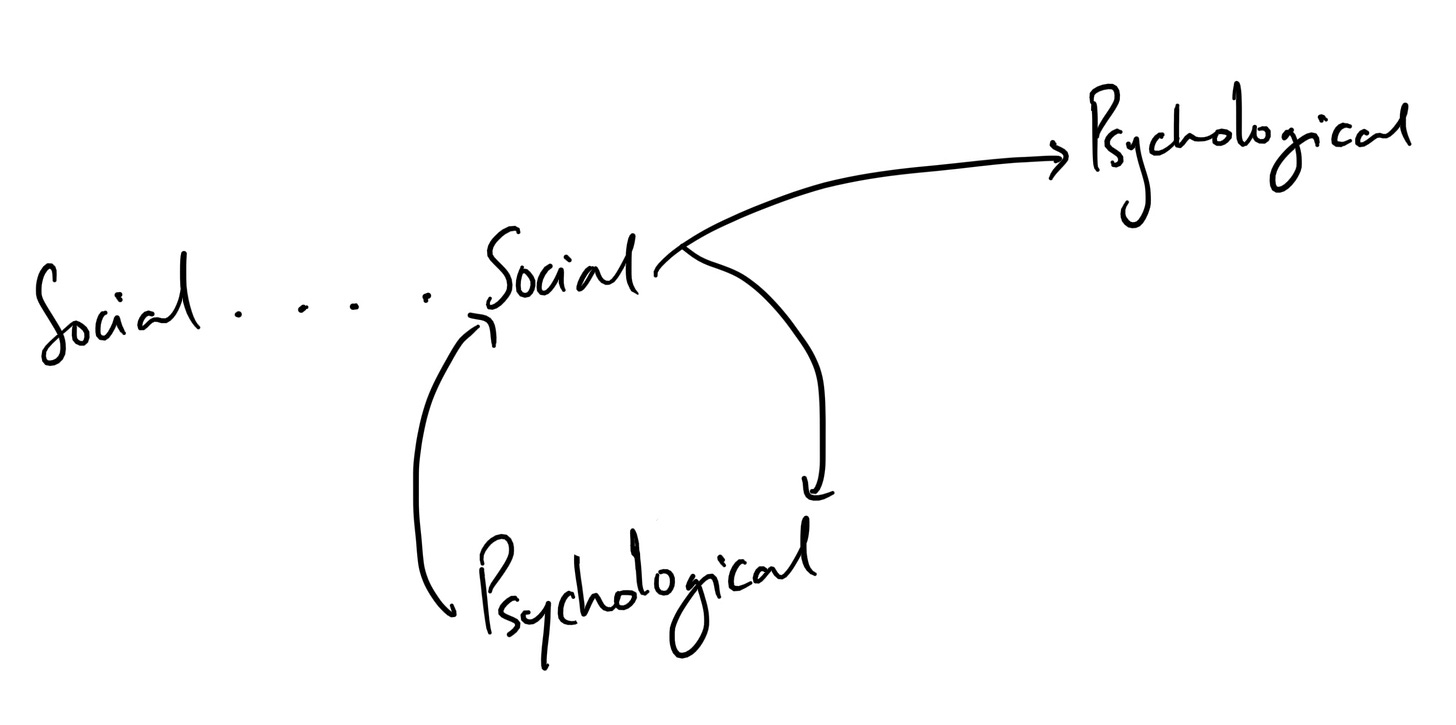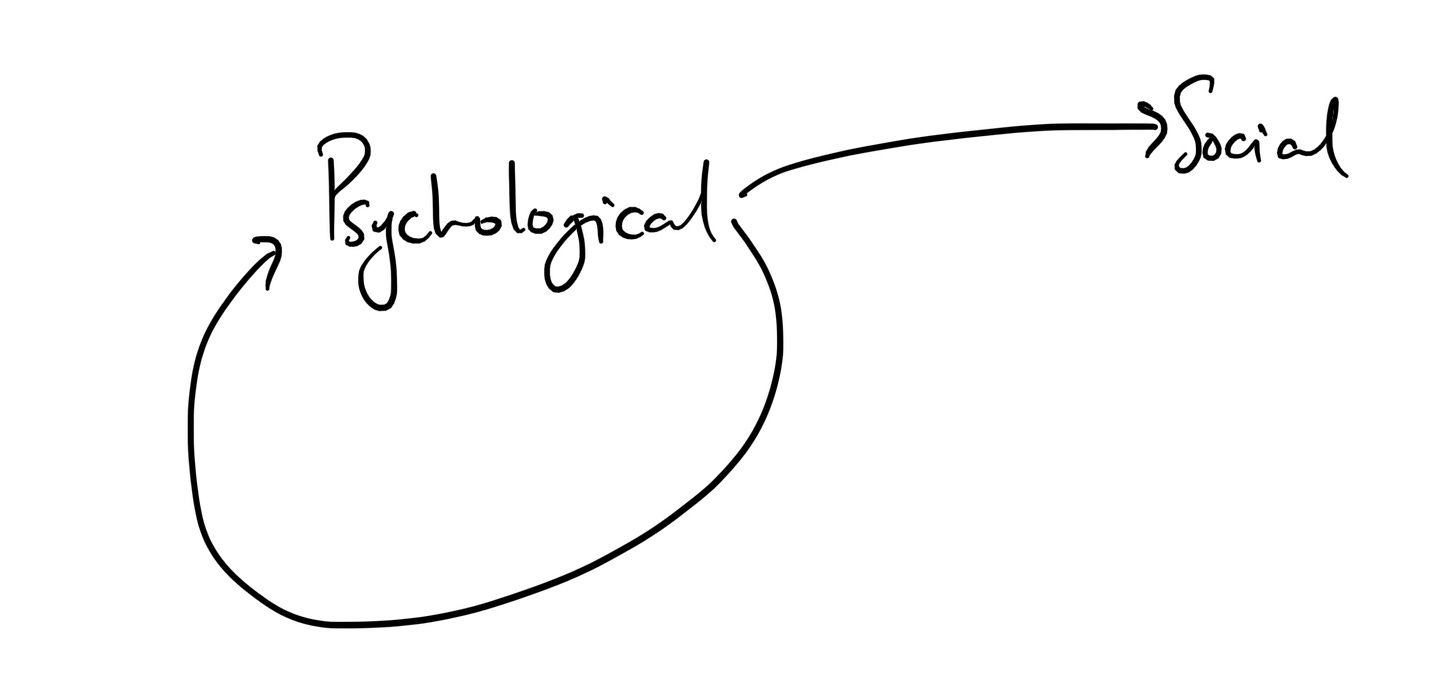Wow-I-never-knew-that learning
Two examples of it | Its big ideas | How to cultivate it in a classroom
“any function in the child’s cultural development appears twice, or on two planes. First it appears on the social plane, and then on the psychological plane”1
Lev Vygotsky
It was an easy fact to throw around. I had spent a few months working with tree surgeons in London, and all of them reckoned there was more to trees than wood, sap, and leaves. Some of them went as far as to reckon that trees were alive in a sense you and I might recognise, even if it was unfamiliar, saying that sometimes they felt like they were in conversation with a tree, that sometimes things happened they couldn’t explain but carried a sense of not being accidental.
So, you can imagine how this was great to toss into casual conversations. Nice little hints of something else to be bantered over, but ultimately assigned as a bit weird and ignorable. You might say it was a fact that fell into the wow-that’s-mystically-weird category.
Men, blokes, didn’t really think like that about nature, anyway. Unless they were a bit weird.
Unlike Vygotsky, I think the development we experience through wow-I-never-knew-that learning originates in either of the planes: the social or the psychological. That said, I think its origin matters - it has much to do with how we react to, deal with, and integrate the wow.
So, in this instance, the wow came to me from the social plane. It gave me a glimpse of how men might talk about their world but, thinking back to how I handled it, I didn’t know how to integrate it into the psychological plane - into how I viewed myself and the culture I was in. It confounded too many covert and overt understandings. All I could do was react to it by treating it as a jokey anecdote.
Sound familiar?
Years later I stumbled across a headline on the Guardian website that felt eerily familiar: The man who thinks trees talk to each other. As I read, I started to understand what those tree surgeons had said, and it was anchored in science so it came with a hint of respectability and thus believability. The idea of the wood-wide-web, with its scientific basis, was striking and it gave me a wow-I-never-knew-that! moment.
And so, when I stumbled across the man’s book a couple of years later, I didn’t hesitate to buy it, and as I read the way I understood the world around me completely shifted. There was wow-I-never-knew-that after wow-I-never-knew-that, page after page. Turns out trees are alive in a sense we can recognise and is kinda familiar. It was no joke, anymore.
What’s going on here? Why did the wow start to have an impact once it came wrapped in respectability?
I wonder if this has something to do with the disruption that a wow can cause to our view of the world, our culture, and thus our sense of self. There is real psychological risk in this. And for me, I’m finding it hard to uncouple that risk from how the mystical way of speaking about trees challenged cultural ideas of masculinity. Is that why I labelled it weird initially?
And then another book, this one a gift, came into my world. And then another one (not a gift, but a recommendation arising from a conversation) pulling at the same thread, but from a completely different perspective. All of a sudden, what I experienced was an increasingly rapid accumulation of wow moments. And I’m brought to a point where the wow-I-never-knew-that moments created a body of understanding and appreciation of an aspect of the world around me that wasn’t there before. The wows led me beyond knowing.
What do I mean by this?
I mean that I felt coherence across the social and psychological planes. The wow was no longer weird, but now integrated with how I knew and - crucial - how I felt about it. In other words, I could hear the story - one that’s always been there - and I got it. It moved me, and it helped me feel safe to see things in the world I had to keep at arms reach previously.
Aren’t the stories we tell powerful? There’s a link here to pūrākau that is worth exploring.
“Pūrākau, a traditional form of Māori narrative, contains philosophical thought, epistemological constructs, cultural codes, and worldviews that are fundamental to our identity as Māori.”2
In other words, stories come at us from the social plane and work their magic on us on the psychological plane. They are identity devices.

But wow-I-never-knew-that-learning can also have its origins in the psychological plane. When it does, the impact is quite different.
I asked in chat for personal examples of wow-I-never-knew-that learning, and Andrea responded with a story that illustrates this point:
“The first time I realised multiplication was repeated addition and straight away knew division was repeated subtraction… helped me understand immediately after why division with fractions produced larger numbers. Mind buzzing !!!! Never looked back”
Think about what’s going on here.
There’s intellectual work happening. Somehow, there’s a lightbulb moment, and that has a physical and emotional response (Mind buzzing !!!). This increases motivation, which, obviously, has been lasting (never looked back).
That phrase ‘never looked back’ is interesting. It hints at how the impact of this wow is different, no? — an immediate feeling of being in command, in control, in sync with maths. And if we look deeply, can we sense the wow in the psychological plane quickly spinning into the social plane? Has the motivation spurred by the wow created a sense of agency that has manifested itself in the world?

The notion of wow-I-never-knew-that learning being a close relation of agency is obvious now I think of it.
Barandiaran, et al, say of agency: “We identify three conditions that a system must meet in order to be considered as a genuine agent: (a) a system must define its own individuality, (b) it must be the active source of activity in its environment (interactional asymmetry), and (c) it must regulate this activity in relation to certain norms (normativity).”3
We cannot disentangle agency from individuality and the culture or environment they find themselves in. And that, to me, suggests agency is about identity. And, as we have seen, wow-I-never-knew-that learning is an identity-shaping kind of learning.
Wow-I-never-knew-that learning: it’s big ideas
Things are often weird before becoming wow
It took a long time for me to become open enough to feel the wow associated with the stories I was told. Before then, while obviously interested, I could only deal with it by categorising it as weird. Did this weird label help it stick? Did this stickiness slowly work subconsciously to build associations that helped me tune in to this idea in the world? Did that tuning in help me feel the wow when it came (again - but this time I heard it)?
The origin of the wow often results in different impacts
Think of the suddenness of the wow’s impact for Andrea compared with what happened with me. Is this because hers originated in the psychological plane? That wow moment buzzed - we can feel the motivation in how she wrote about it. It also fed into a sense of being capable, a positive building up of identity. I wonder if it confirmed something for her?
This didn’t happen with me. There was too much divergence between the social and psychological planes, too much to grapple with. It was a process of challenge, not confirmation. Does this explain the long amount of time it took for the impact of the wow to manifest?
We can’t control when or where wows come from
I heard those stories that (eventually) wowed me because I was there, not because I sought them out. Andrea’s wow was a lightbulb moment, sprung on her from who-knows-where in her mind. In other words, we stumble across opportunities to be wowed all the time. We just need to be aware, alert enough, open to them, and curious enough.
Wows open doors that illuminate hidden connections and ways of being
I can’t help but think that this is where wows can (do?) lead us - to a space of magic. Call it the lighbulb moment, a spark of insight, a story that captures us, a fact the blows us away, on some level all these opportunities for wow have a sense of the mystical, of magic about them – they all show us something that we never saw before. It’s in this seeing that transformation occurs.
Ways to cultivate wow-I-never-knew-that learning in the classroom
The social plane
Be brave enough to tell stories of the mystical aspects of your experiences
Become a person in technicolour by telling the learners about weird things you’ve experienced. Are you grappling with them? Have you come to terms with them? What do you believe that can’t be proved but you just know is true?
Talk about cultural norms and how they evolve
Help the kids see that things change, that at times this is a struggle but that’s ok; that what matters is being open to change; that there are many ways of being.
Fill the environment with stories
Build a library in your room - physical and digital - that kids can access anytime and get into the habit of doing so. Make sure it reflects their worlds and wonderings. Share awesome books and readings. Your talk about what wowed you in them will help the kids hear how you are alert to that way of engaging with the world.
The psychological plane
Trust the learners to make connections
Don’t force things to be wows. But, make sure you’ve got time to listen to the kids talk, and for you to talk 1-1 with them in an unpressured way so that wows can emerge.
Approach learning in a way that makes wows possible
Some approaches to learning are more likely to elicit wows than others. I think this is where agency is important: it gives space for the learner to have lightbulb moments, which, after all, are more likely to happen when we’re doing things that matter to us.
Vygotsky, found in Arshad, M., & Chen, W. H. (2009). Vygotsky’s socio-cultural theory of literacy Scaffolding children to read and write at an early age. Wacana, Journal of the Humanities of Indonesia, 11(2), 319. [Link]



